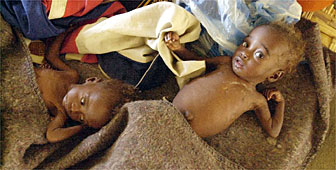Swiss aid for southern Africa “not enough”

Aid experts say Switzerland is not doing enough to respond to the food crisis in southern Africa where millions are facing starvation.
The Swiss Agency for Development and Cooperation (SDC) has so far this year donated SFr3 million ($2.1 million) in aid to southern African countries worst affected by food shortages, brought on by the lack of rainfall and ruined harvests.
Earlier this month, the United Nations World Food Programme launched a worldwide appeal for $507 million to avert mass starvation in the region.
Non-governmental organisations say Swiss aid falls far short of the amount required to get food supplies to the region and pales in comparison to donations from Scandinavian countries.
“Three million francs is clearly not enough to fight a famine,” François Meienberg, a spokesman for the Swiss NGO, the Berne Declaration, told swissinfo. “One of our basic demands is that development aid should account for 0.7 per cent of the gross domestic product – and we’re still a long way off that target.”
Millions face starvation
According to estimates from the World Food Programme, as many as 13 million people in southern Africa may become dependent on emergency food supplies until the next harvests in spring 2003. Roughly half that number live in Zimbabwe.
“In the urban areas, it looks like life is going on as usual, but inside the shops, basic staples such as maize, sugar and oil are missing and people queue up as soon as there is a delivery,” said Thomas Mumprecht, one of the SDC’s logistics experts in Harare, Zimbabwe.
“Meanwhile, in rural regions, you see that the farming land is really dry and that there’s no water around,” he continued. “Those who have to live from their land haven’t been able to harvest anything this year and they’re running out of food.”
Mumprecht believes that international aid agencies will have to remain active in the region for up to 13 months if, as predicted, drought conditions are worsened by the onset of the El Nino weather system later this year.
Some aid getting through
However, he pointed out that aid had already made a difference to the lives of some of the hardest-hit people. “Those who’ve received food aid are very happy about it and are in a far better state than a few months ago,” he said.
Responding to the criticism, the SDC maintains that its donations are already substantial given the relatively small size of Switzerland.
“We’re a small country and our possibilities are limited … but we have tried to address the situation as early as possible,” said Joachim Ahrens, an SDC spokesman. “But we do now have to prepare for the worst.”
Swiss funds are mainly being used to finance the distribution of food supplies to the worst affected countries, including Malawi, Mozambique, Zimbabwe and Lesotho. Swiss humanitarian experts have also been sent out to the region.
However, the Berne Declaration argues that Switzerland should be helping politically as well as financially
“Aid is only one part in the battle against famine – we shouldn’t forget about the importance of politics and policy,” said François Meienberg. “Switzerland could play a crucial role within organisations such as the World Trade Organization by influencing its agricultural policy to help [African] farmers.”
by Scott Capper and Vanessa Mock

In compliance with the JTI standards
More: SWI swissinfo.ch certified by the Journalism Trust Initiative
You can find an overview of ongoing debates with our journalists here . Please join us!
If you want to start a conversation about a topic raised in this article or want to report factual errors, email us at english@swissinfo.ch.